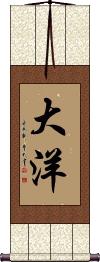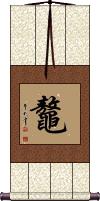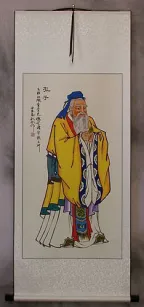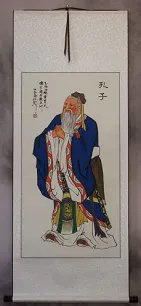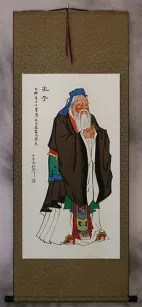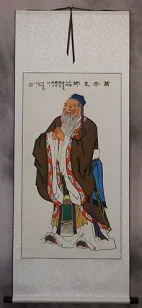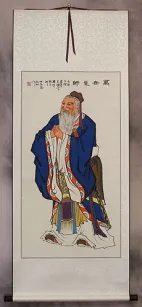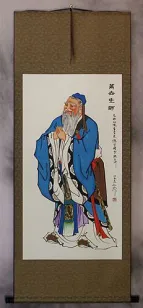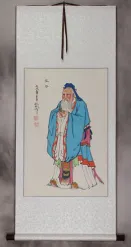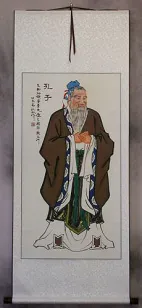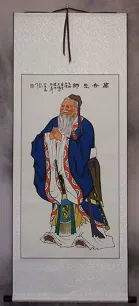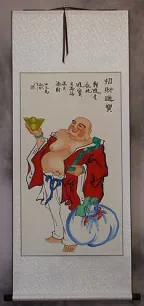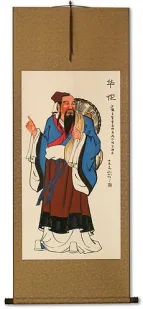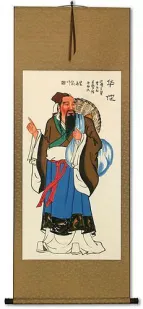Many custom options...
And formats...

Great Sea in Chinese / Japanese...
Buy a Great Sea calligraphy wall scroll here!
Personalize your custom “Great Sea” project by clicking the button next to your favorite “Great Sea” title below...
Great Sea
This is a rarely-used word for ocean in Japanese, Chinese, and Korean. This is here mostly for reference - please order a different ocean for your custom calligraphy wall scroll.
The first character means “big” or “great.”
The second means “ocean” or “body of water” (it can sometimes mean “foreign” but not in this case).
The first character designates that you are talking about a great or huge body of water (certainly a major ocean and not a smaller sea).
Legendary Turtle
鼇 means “legendary turtle” in Chinese. 鼇 is a great mythological turtle that travels the seas. The creature is comparable to the dragon of China, however, it so happens that dragons became a bit more famous as history progressed. In modern Chinese, this character can just refer to a large sea turtle.
Note: 鼇 can be pronounced in Korean but this is a very rare Korean Hanja form - it hasn't been used in Korea for at least a few hundred years (even before they switched to Hangul characters).
A Bright Future
Incredible 10,000-Mile Flight of the Peng
鵬程萬里 is an ancient Chinese proverb used in modern times to wish someone a long and successful career.
It's really about the 10,000 Flight of the Peng (Peng, also known as Roc is a mythical fish that can turn into a bird and take flight).

莊子
Zhuangzi or Chuang Tzu
Breaking down each character:
1. Peng or Roc (a kind of bird).
2. Journey (in this case, a flight).
3. 10,000 (Ten Thousand).
4. Li is a unit of distance often referred to as a “Chinese Mile,” though the real distance is about half a kilometer.
Direct Translation: “Peng's Journey [of] 10,000 Li.”
Literal meaning: “The 10,000-Li Flying Range Of The Roc.”
Perceived meaning: “To have a bright future” or “To go far.”
This proverb/idiom comes from the book of Zhuangzi or Chuang Tzu. It tells the tale of a huge fish that could turn into a gigantic bird. This bird was called a “peng” and was many miles long. This legendary size allowed the Peng to fly from the Northern Sea to the Southern Sea in a single bound.
Wishing someone “a Peng's Journey of 10,000 Li” will imply that they can travel far without stopping and will have great success, a long career, and a prosperous future.
This in-stock artwork might be what you are looking for, and ships right away...
Gallery Price: $200.00
Your Price: $79.88
Gallery Price: $200.00
Your Price: $79.88
Not the results for Great Sea that you were looking for?
Below are some entries from our dictionary that may match your Great Sea search...
| Characters If shown, 2nd row is Simp. Chinese |
Pronunciation Romanization |
Simple Dictionary Definition |
海 see styles |
hǎi hai3 hai umi(p); mi(ok); wata(ok); wada(ok) うみ(P); み(ok); わた(ok); わだ(ok) |
More info & calligraphy: Ocean / Seasea; ocean; waters; (male given name) Wataru sāgara, the ocean, the sea. |
卍 see styles |
wàn wan4 wan manji まんじ |
swastika, a sacred and auspicious symbol in Hinduism, Buddhism, and Jainism swastika (esp. a counterclockwise swastika as a Buddhist symbol); fylfot; gammadion; (given name) Manji sauvastika, 塞縛悉底迦; also styled 室利靺瑳 śrīvatsa, lucky sign, Viṣṇu's breast-curl or mark, tr. by 海雲 sea-cloud, or cirrhus. Used as a fancy form of 萬 or 萬; and is also written in a form said to resemble a curl. It is the 4th of the auspicious signs in the footprint of Buddha, and is a mystic diagram of great antiquity. To be distinguished from 卐svastika, the crampons of which turn to the right. |
巨海 see styles |
jù hǎi ju4 hai3 chü hai komi こみ |
(surname) Komi great sea |
摩竭 see styles |
mó jié mo2 jie2 mo chieh makatsu |
(摩竭羅) makara. A sea monster, either in the form of a great fish, e.g. a whale, or a great turtle. Also 摩伽羅 (or 摩迦羅). |
波濤 波涛 see styles |
bō tāo bo1 tao1 po t`ao po tao hatou / hato はとう |
great waves; billows surging sea; rough sea; large waves; (surname) Hatou waves |
滄溟 see styles |
soumei / some そうめい |
(rare) great blue sea; ocean |
縛芻 缚刍 see styles |
fú chú fu2 chu2 fu ch`u fu chu Bakusu |
Vakṣu; Vaṅkṣu; 婆芻 (or 婆槎 or婆輸); 薄叉; 博叉; the Oxus 靑河 or Blue River, one of the 'four great rivers of Jambudvīpa', rising in the west of the Anavatapta lake (Tibet) and flowing into the north-west sea, the Caspian; cf. 西城記 1. |
遠航 远航 see styles |
yuǎn háng yuan3 hang2 yüan hang |
to travel a great distance by sea or air; voyage; long-haul flight |
大教網 大教网 see styles |
dà jiào wǎng da4 jiao4 wang3 ta chiao wang daikyō mō |
The net of the great teaching, which saves men from the sea of mortal life. |
大海印 see styles |
dà hǎi yìn da4 hai3 yin4 ta hai yin dai kaiin |
The ocean symbol, i.e. as the face of the sea reflects all forms, so the samādhi of a bodhisattva reflects to him all truths; it is also termed 海印三昧. |
大海衆 大海众 see styles |
dà hǎi zhòng da4 hai3 zhong4 ta hai chung dai kaishu |
The great ocean congregation; as all waters flowing into the sea become salty, so all ranks flowing into the sangha become of one flavour and lose old differentiations. |
大苦海 see styles |
dà kǔ hǎi da4 ku3 hai3 ta k`u hai ta ku hai dai kukai |
The great bitter sea, or great sea of suffering i.e. of mortality in the six gati, or ways of incarnate existence. |
大願船 大愿船 see styles |
dà yuàn chuán da4 yuan4 chuan2 ta yüan ch`uan ta yüan chuan daigan sen |
The great vow boat, i.e. that of Amitābha, which ferries the believer over the sea of mortality to the Pure Land. |
如意珠 see styles |
rú yì zhū ru2 yi4 zhu1 ju i chu nyoiju |
cintāmaṇi, a fabulous gem, the philosopher's stone, the talisman-pearl capable of responding to every wish, said to be obtained from the dragon-king of the sea, or the head of the great fish, Makara, or the relics of a Buddha. It is also called 如意寳 (如意寳珠); 如意摩尼. |
盂蘭盆 盂兰盆 see styles |
yú lán pén yu2 lan2 pen2 yü lan p`en yü lan pen urabon うらぼん |
see 盂蘭盆會|盂兰盆会[Yu2 lan2 pen2 hui4] Bon festival (Buddhist ceremony held around July 15); Feast of Lanterns (盂蘭); 鳥藍婆 (鳥藍婆拏) ullambana 盂蘭 may be another form of lambana or avalamba, "hanging down," "depending," "support"; it is intp. "to hang upside down", or "to be in suspense", referring to extreme suffering in purgatory; but there is a suggestion of the dependence of the dead on the living. By some 盆 is regarded as a Chinese word, not part of the transliteration, meaning a vessel filled with offerings of food. The term is applied to the festival of All Souls, held about the 15th of the 7th moon, when masses are read by Buddhist and Taoist priests and elaborate offerings made to the Buddhist Trinity for the purpose of releasing from purgatory the souls of those who have died on land or sea. The Ullambanapātra Sutra is attributed to Śākyamuni, of course incorrectly; it was first tr. into Chinese by Dharmaraksha, A.D. 266-313 or 317; the first masses are not reported until the time of Liang Wudi, A.D. 538; and were popularized by Amogha (A.D. 732) under the influence of the Yogācārya School. They are generally observed in China, but are unknown to Southern Buddhism. The "idea of intercession on the part of the priesthood for the benefit of" souls in hell "is utterly antagonistic to the explicit teaching of primitive Buddhism'" The origin of the custom is unknown, but it is foisted on to Śākyamuni, whose disciple Maudgalyāyana is represented as having been to purgatory to relieve his mother's sufferings. Śākyamuni told him that only the united efforts of the whole priesthood 十方衆會 could alleviate the pains of the suffering. The mere suggestion of an All Souls Day with a great national day for the monks is sufficient to account for the spread of the festival. Eitel says: "Engrafted upon the narrative ancestral worship, this ceremonial for feeding the ghost of deceased ancestors of seven generations obtained immense popularity and is now practised by everybody in China, by Taoists even and by Confucianists." All kinds of food offerings are made and paper garments, etc., burnt. The occasion, 7th moon, 15th day, is known as the盂蘭會 (or 盂蘭盆會 or 盂蘭齋 or 盂蘭盆齋) and the sutra as 盂蘭經 (or 盂蘭盆經). |
五重世界 see styles |
wǔ zhòng shì jiè wu3 zhong4 shi4 jie4 wu chung shih chieh gojū sekai |
The five graduated series of universes: (1) 三千大千世界 tri-sahasra-mahā-sahasra-loka-dhātu; a universe, or chiliocosm; (2) such chiliocosms, numerous as the sands of Ganges, form one Buddha-universe; (3) an aggregation of these forms a Buddha-universe ocean; (4) an aggregation of these latter forms a Buddha-realm seed; (5) an infinite aggregation of these seeds forms a great Buddha-universe, 智度論 50. Another division is (1) a world, or universe; (2) a Buddha-nature universe, with a different interpretation; and the remaining three areas above, the sea, the seed, and the whole Buddha-universe. |
Variations: |
soumei / some そうめい |
(rare) (form) great blue sea; ocean |
大唐南海寄歸内法傳 大唐南海寄归内法传 see styles |
dà táng nán hǎi jì guī nèi fǎ zhuàn da4 tang2 nan2 hai3 ji4 gui1 nei4 fa3 zhuan4 ta t`ang nan hai chi kuei nei fa chuan ta tang nan hai chi kuei nei fa chuan Daitō nankai kiki naihō den |
The Great Tang Record of Buddhist Practices Sent Home from the Southern Sea |
ホワイトフィンサージャンフィッシュ see styles |
howaitofinsaajanfisshu / howaitofinsajanfisshu ホワイトフィンサージャンフィッシュ |
whitefin surgeonfish (Acanthurus albipectoralis, species of Western Pacific tang found on the Great Barrier Reef through the Coral Sea to Tonga) |
ホワイトフィンサージョンフィッシュ see styles |
howaitofinsaajonfisshu / howaitofinsajonfisshu ホワイトフィンサージョンフィッシュ |
whitefin surgeonfish (Acanthurus albipectoralis, species of Western Pacific tang found on the Great Barrier Reef through the Coral Sea to Tonga) |
Variations: |
howaitofinsaajonfisshu; howaitofinsaajanfisshu / howaitofinsajonfisshu; howaitofinsajanfisshu ホワイトフィンサージョンフィッシュ; ホワイトフィンサージャンフィッシュ |
whitefin surgeonfish (Acanthurus albipectoralis, species of Western Pacific tang found on the Great Barrier Reef through the Coral Sea to Tonga) |
Variations: |
鐃循wai鐃夙fuwa申鐃藷sa¥申鐃緒申鐃緒申鐃春wa申鐃獣wa申鐃緒申; 鐃循wai鐃夙fuwa申鐃藷sa¥申鐃緒申鐃緒申鐃春wa申鐃獣wa申鐃緒申 鐃循ワイ鐃夙フワ申鐃藷サ¥申鐃緒申鐃緒申鐃春ワ申鐃獣ワ申鐃緒申; 鐃循ワイ鐃夙フワ申鐃藷サ¥申鐃緒申鐃緒申鐃春ワ申鐃獣ワ申鐃緒申 |
whitefin surgeonfish (Acanthurus albipectoralis, species of Western Pacific tang found on the Great Barrier Reef through the Coral Sea to Tonga) |
Variations: |
howaitofinsaajonfisshu; howaitofinsaajanfisshu; howaitofin saajonfisshu; howaitofin saajanfisshu / howaitofinsajonfisshu; howaitofinsajanfisshu; howaitofin sajonfisshu; howaitofin sajanfisshu ホワイトフィンサージョンフィッシュ; ホワイトフィンサージャンフィッシュ; ホワイトフィン・サージョンフィッシュ; ホワイトフィン・サージャンフィッシュ |
whitefin surgeonfish (Acanthurus albipectoralis, species of Western Pacific tang found on the Great Barrier Reef through the Coral Sea to Tonga) |
The following table may be helpful for those studying Chinese or Japanese...
| Title | Characters | Romaji (Romanized Japanese) | Various forms of Romanized Chinese | |
| Great Sea | 大洋 | tai you / taiyou / tai yo | dà yáng / da4 yang2 / da yang / dayang | ta yang / tayang |
| Legendary Turtle | 鼇 | áo / ao2 / ao | ||
| A Bright Future | 鵬程萬里 鹏程万里 | péng chéng wàn lǐ peng2 cheng2 wan4 li3 peng cheng wan li pengchengwanli | p`eng ch`eng wan li pengchengwanli peng cheng wan li |
|
| In some entries above you will see that characters have different versions above and below a line. In these cases, the characters above the line are Traditional Chinese, while the ones below are Simplified Chinese. | ||||
Successful Chinese Character and Japanese Kanji calligraphy searches within the last few hours...
